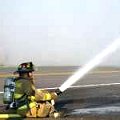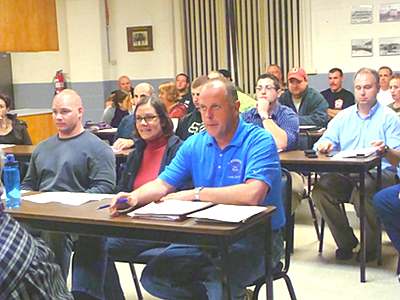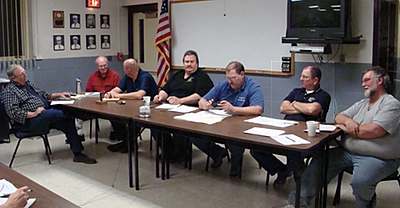- By Dan Veaner
- News
 Print
Print  Lansing Fire Department members felt they were blindsided at their monthly meeting a couple of weeks ago when a short statement from the district commissioners was read, informing them that the volunteer Fire Chief position would be replaced by a paid position by next June. This week department members came to the Commissioner's meeting loaded for bear. The meeting was confrontational to the point where at one point Fire Commissioner Chairman Robert Wagner threatened to clear the room. Chief Scott Purcell is opposed to the move, and was supported Tuesday by nearly 30 of his fellow volunteers.
Lansing Fire Department members felt they were blindsided at their monthly meeting a couple of weeks ago when a short statement from the district commissioners was read, informing them that the volunteer Fire Chief position would be replaced by a paid position by next June. This week department members came to the Commissioner's meeting loaded for bear. The meeting was confrontational to the point where at one point Fire Commissioner Chairman Robert Wagner threatened to clear the room. Chief Scott Purcell is opposed to the move, and was supported Tuesday by nearly 30 of his fellow volunteers."As far as I am concerned spending the taxpayers' dollars for a full time fire chief is not warranted," he says. "They don't need a paid chief. It shouldn't even be an issue and it should have been discussed in open meetings before this."
That was a major issue for the members present. Most were angry that Purcell and the other chiefs weren't consulted about the decision that evidently stemmed from concerns about work load, the legal inability to compensate volunteers, concerns about driver training, and liability for the volunteer chief. Purcell said that the membership is not a bunch of misfits, but rather come from a variety of different backgrounds, talents and education that represent a resource that commissioners should want to take advantage of by including member input.
"All we were asking for was a little help doing the not-so-fun stuff," he said. "Most people in this room like going on the calls, like getting their hands dirty. But when it comes to me sitting in my office, typing up fire reports for the state is a secretary's job."
 Lansing Fire Chief Scott Purcell (blue shirt, at front) was backed up by almost 30 Lansing Volunteer Fire Department members at Tuesday's Fire Commissioner's meeting.
Lansing Fire Chief Scott Purcell (blue shirt, at front) was backed up by almost 30 Lansing Volunteer Fire Department members at Tuesday's Fire Commissioner's meeting."You've got a man right there who is willing to take whatever liability you want to throw at him. Work with him," said past Chief Tom Dorwood. "I don't know if you have asked him what's going on with the driver training program. I don't know if you've asked him what's going on in the Chief's office. I don't know if anybody's asked him about the liabilities out there. You have an opportunity right now to step back and say 'what do we want to address?' Do it the right way."
Charlie 'Cricket' Purcell questioned whether commissioners had broken state public meeting laws in making the decision outside of an official public meeting. Kim Sweeney and Dan Pine read statements condemning the decision and the process of making it, and most of the other members present had questions and comments.
Dorwood echoed Purcell's recommendation that Commissioners take more time to decide when and whether to hire a paid chief. Several members asked the commissioners to explain what led them to the decision, but others shouted them down as they tried to talk. Several times Purcell asked members to calm down and focus on a respectful discussion of the issues.
One fear was that a paid chief would be impossible to fire once he is ensconced in the position. Fire District Attorney Dave Garwood agreed that once a civil service chief is past the probationary hiring period it is difficult, but not impossible to remove. But he noted that the process is a long one starting with creating a new civil service position, administering an exam, which if passed would not guarantee the chief the position. If he keeps it at that point there would be a probationary period before the job becomes permanent.
Eventually the commissioners gave their reasons for wanting a paid chief. Commissioner Jeff Walters said that it came from a letter from Purcell asking for administrative help, and legal issues preventing payment to volunteers, something the department did in the past, but was advised against by legal counsel. Commissioner Larry Creighton said many members had told him they wanted it, and Purcell needs more support from the other chiefs.
 Right to left: Commissioner Alvin Parker, District Treasurer George Guesslein, Attorney Dave Garwood, Commissioners Robert Wagner, Jeffery Walters, Michael Day, and Larry Creighton
Right to left: Commissioner Alvin Parker, District Treasurer George Guesslein, Attorney Dave Garwood, Commissioners Robert Wagner, Jeffery Walters, Michael Day, and Larry CreightonCommissioner Alvin Parker said that there are too many members who can't drive the fire equipment to calls, and training to get a license is taking too long.
"There's something wrong with this picture that we're having people showing up who can't respond," he said. "We need to have drivers."
Commissioner Michael Day said that as the Lansing community grows Purcell needs help, and expressed concerns about the chief's liability. Wagner said that an outsourced trainer would solve the problem of too few drivers.
"The lawyer stated he could poll the commissioners and come up with five As as answers," said Deputy Chief Brad George. "But we came up with A, B, C, D, and E. There are five different reasons why we are going with a paid chief, but it sounds like we're going with a paid department."
Purcell agreed driver training takes too long, but stressed it is important to train drivers on equipment that can cost a half million dollars the right way, not just give them a 30 minute once-over. Wagner asked him whether he would accept an outside trainer of the district agreed to contract one. Purcell said he prefers Deputy Chief Brad George doing the training because he is familiar with Lansing's equipment, but he would be open to the suggestion. He also noted that a paid administrative assistant could take care of state reports and other paperwork that would free him to perform his duties as Chief.
Each year the volunteer membership elects their own officers. For the past several years they have elected Purcell to be their chief. Current chief include Purcell, Deputy Chief Brad George, 1st Assistant Chief: Darrell Rhoads, 2nd Assistant Chief Tom Cooper and 3rd Assistant Chief Mike Drake. Several members were dismayed that their ability to elect a chief was being threatened. That spoke to Purcell's concern that a paid chief would cause morale problems that would discourage volunteers, eventually forcing Lansing to hire more paid positions.
"We work well together as a volunteer group," he says. "Now one guy is going to be making between sixty and eighty thousand and benefits. If I'm making eighty thousand and you come down here as a volunteer you're probably not going to want to do the dirty work when the guy next to you is making eighty thousand."
Volunteer Dan Ferguson noted that the meeting provided an opportunity for commissioners to backtrack and avoid the pitfalls other departments have fallen into.
"Do what's right for the community," he urged. "Keep it positive and move it forward, please."
Purcell says that $150,000 has been budgeted for a paid chief, and if the move caused a drop in volunteers it could cost residents significantly more in taxes.
"We just don't have the call volume here to warrant it," he says. "We have eight hundred and some calls per year, half of them EMS. When you break it down we have 1.2 fire calls in a 24 hour period. Having a paid chief here during the day is only covering a third of your day. The other two thirds of the day are going to be covered by the volunteers. So what are the chances of all the calls coming between eight and five? It's not going to happen."
Once commissioners had identified the problems they hoped would be solved by a paid chief, many members suggested alternatives they said would address those issues more constructively. Wagner said he then thought commissioners should meet with the chiefs in a closed session as a first step. All the commissioners were polled, and they agreed, 5-0, which prompted spontaneous applause.
v7i45



